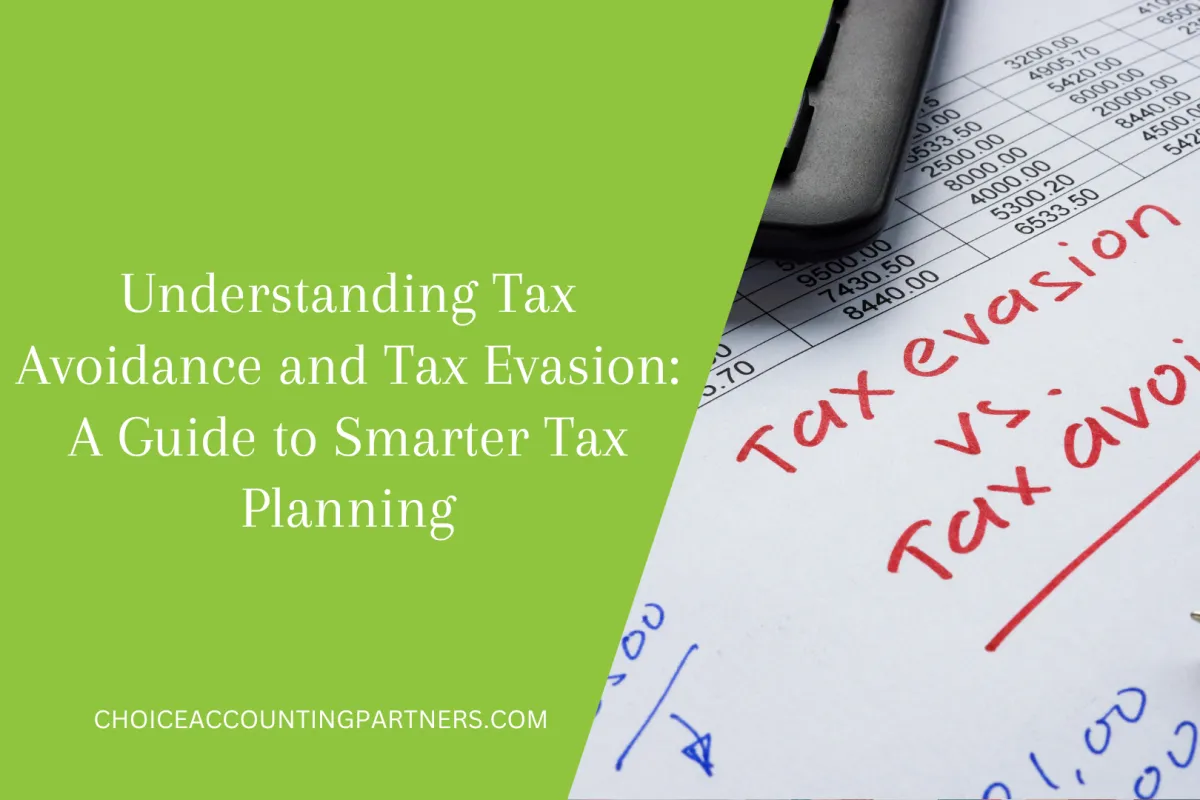

ON THE BLOG

Understanding Tax Avoidance and Tax Evasion: A Guide to Smarter Tax Planning
Understanding Tax Avoidance and Tax Evasion: A Guide to Smarter Tax Planning
Introduction:
Tax planning is an essential component of financial strategy for individuals and businesses alike. However, it’s critical to distinguish between tax avoidance, a legal and ethical practice, and tax evasion, an illegal and punishable offense. This distinction is not only about staying compliant but also about optimizing your financial outcomes without crossing into dangerous territory.
Let’s delve deeper into what these terms mean, their implications, and how you can use this knowledge to your advantage.

What Is Tax Avoidance?
Tax avoidance is the process of minimizing tax liability by leveraging legal provisions within the tax code. The IRS explicitly encourages taxpayers to take advantage of these opportunities, which are designed to incentivize activities such as saving for retirement, investing, or growing a business.
Examples of Legal Tax Avoidance Strategies:
1. Maximizing the Standard Deduction
For the 2025 tax year, the IRS allows taxpayers to claim a standard deduction based on their filing status:
o Single filers: $15,000
o Married filing jointly: $30,000
o Head of household: $22,500
By claiming this deduction, taxpayers reduce their taxable income without itemizing expenses.
2. Utilizing Retirement Accounts
Contributions to retirement accounts such as Traditional IRAs or 401(k)s are often tax-deductible.
o For 2025, you can contribute up to $7,000 to an IRA, with an additional $1,000 allowed for those aged 50 or older.
o Employers often match contributions to 401(k) plans—an opportunity to increase retirement savings and reduce taxable income simultaneously.
3. Taking Advantage of Tax Credits
o Child Tax Credit (CTC): Up to $2,000 per qualifying child under the age of 17.
o Lifetime Learning Credit: Up to $2,000 per tax return for qualified education expenses.
Tax credits reduce your tax liability directly, making them more impactful than deductions.
4. Leveraging Business Deductions
Entrepreneurs and small businesses can deduct a wide array of expenses, such as:
o Office rent and utilities
o Marketing and advertising costs
o Employee wages and benefits
o Professional services, such as legal or accounting fees
Proper documentation is essential to substantiate these deductions and ensure compliance.
What Is Tax Evasion?
Tax evasion refers to the illegal practice of avoiding tax obligations through deception or fraud.
Examples include:
• Underreporting income: Declaring less income than earned.
• Inflating deductions: Claiming expenses that are not legitimate.
• Using offshore accounts to hide money: Attempting to conceal taxable income.
Penalties for Tax Evasion
The consequences of tax evasion are severe and include:
• Fines: Up to $100,000 for individuals and $500,000 for corporations.
• Imprisonment: Up to 5 years.
• Additional costs: Legal fees and penalties for late payments or inaccuracies.
These penalties underscore the importance of accurate and honest tax reporting.
How the Tax Gap Affects You
The tax gap—the difference between taxes owed and those paid—was estimated to reach $688 billion in 2021. When individuals or businesses fail to pay their fair share, compliant taxpayers bear the financial burden.
Closing the Gap
To address this issue, the IRS has ramped up its enforcement efforts, including increased audits for high-income earners and corporations. Staying compliant not only avoids penalties but also ensures fairness within the system.
Advanced Tax Strategies for Smarter Planning
Beyond standard deductions and credits, here are some advanced tax strategies to consider:
1. Health Savings Accounts (HSAs):
Contribute pre-tax dollars to an HSA to pay for qualified medical expenses. Contributions, earnings, and withdrawals for eligible expenses are tax-free.
2. Capital Gains Tax Optimization:
o Hold investments for at least a year to qualify for lower long-term capital gains tax rates.
o Use tax-loss harvesting to offset gains with losses.
3. Estate and Gift Tax Planning:
o Gift up to $17,000 per recipient annually without triggering gift tax.
o Use trusts to transfer wealth efficiently while minimizing estate tax liability.
4. Energy Tax Incentives:
o Claim credits for energy-efficient home improvements or the installation of solar panels.
o Businesses can benefit from deductions related to energy-efficient equipment upgrades.
How to Stay Compliant and Avoid Tax Evasion
1. Maintain Accurate Records
Keep detailed records of all financial transactions, including income, expenses, and receipts.
2. Stay Updated on Tax Law Changes
Tax laws evolve frequently. Regularly review IRS announcements or work with a tax professional to stay informed.
3. Conduct Regular Tax Reviews
Review your financial situation annually to identify potential tax-saving opportunities or compliance issues.
4. Work with a Tax Professional
A tax advisor can help you navigate complex rules, maximize deductions, and ensure you stay compliant.
Partner with Choice Accounting Partners
At Choice Accounting Partners, we offer comprehensive tax planning and advisory services to help individuals and businesses:
• Identify legal tax-saving opportunities.
• Navigate complex tax laws with ease.
• Plan for a financially secure future.
📅 Schedule a FREE consultation today and let us craft a personalized tax strategy for you.
Stay informed by following our blog for regular updates on tax-saving tips, compliance best practices, and financial strategies.





